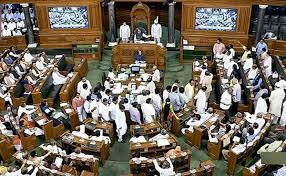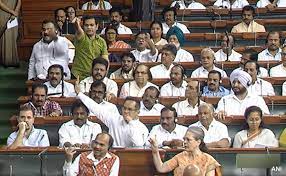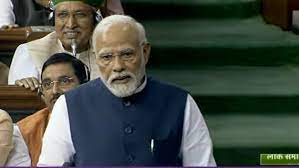Introduction:
It was felt in the final day of proceedings in Parliament on no-confidence debate that we have lost essence of political discourse,
Here is a Look Back at the First No-Confidence Motion in Indian Parliamentary History:-
In the annals of India’s parliamentary history, the first-ever no-confidence motion was introduced on August 22, 1963. The proposer of this significant motion was Acharya J.B. Kripalani of the Praja Socialist Party. Kripalani had stated at the time, “With a heavy heart, I present this proposal against the government, which includes my comrades of thirty years and close friends. However, I am bound by my duties and cannot ignore the government’s mistakes.”

During that era, Prime Minister Pandit Jawaharlal Nehru responded, “Such motions should continue to be presented in the Lok Sabha so that Members of Parliament can openly speak against the government, reflect its shortcomings, and address issues in their constituencies, especially when the majority government is not at risk.”
The no-confidence motion failed:
But what happened on that Thursday? The no-confidence motion failed. The opposition had brought forward the motion in the Lok Sabha with the aim of discussing the pertinent issues in Manipur, but the essence of purpose seemed lost. While the opposition leaders spoke at length, when the Prime Minister began addressing the matter, the opposition walked out. This might have been a strategic move, but where was the essence of constructive dialogue? Where was the creativity? For three days, both sides indulged in blame games and theatrics.
Subject of Discussion:
If Manipur was the subject of discussion, why didn’t the opposition offer suggestions and solutions instead of merely accusing each other? Why didn’t the ruling party offer some remedies or listen attentively to the opposition’s concerns? Perhaps both sides could have displayed creativity, leading to potential solutions for the challenges faced by Manipur.
No-Patience to Listen:
However, in today’s political landscape, where is the creativity in politics? Where is the patience among politicians? When they speak, it seems they are just expressing anger. When they give speeches, it feels like they are seeking revenge. If they are not willing to move forward in finding solutions to serious issues, then what is the purpose of such discussions? Why are millions being spent on parliamentary proceedings? Why is the valuable time of the country and its people being wasted?

Nowhere is it written that only the government will resolve every issue, and the opposition’s role is limited to pointing fingers at the government. True, if the government is veering off course, it is the opposition’s duty to guide it back on track. Hold it accountable for its mistakes.
Should have constructive Role:
However, this doesn’t mean the opposition doesn’t have a constructive role. It does. As much as the government is responsible, so is the opposition. As much as the government has responsibilities, the opposition has them too. Yet, current circumstances are such that the ruling and opposition parties don’t want to hear each other. Beyond attempting to belittle one another, it seems they have lost any other purpose.

But the current scenario is such that both the ruling and opposition parties seem unwilling to listen to each other. Beyond trying to undermine one another, it appears they have lost sight of any other purpose.
Highlights of No-Cofidence Motion
A Historic Milestone: The Birth of India’s First No-Confidence Motion (1963)
- The Pioneering Proposition by Acharya J.B. Kripalani
- Kripalani’s Weighty Words: A Proposal Against Friends and Government’s Mistakes
Nehru’s Vision: Nurturing Open Dialogue in Parliament
- Prime Minister Nehru’s Perspective on No-Confidence Motions
- Empowering MPs to Address Government Shortcomings
The Unexpected Outcome: Failure of the No-Confidence Motion
- The Opposition’s Intentions: Discussing Manipur’s Challenges
- A Loss of Purpose: From Dialogue to Drama
Vanishing Dialogue: Today’s Political Landscape
- Lack of Creativity and Patience Among Politicians
- Empty Rhetoric and Revenge-Seeking Discourse
The Futility of Superficial Discourse: Challenges and Questions
- Unveiling the Futility of Discussions Without Substance
- Squandering Resources: The Cost of Ineffective Parliamentary Proceedings
Reclaiming Purpose: Roles of Government and Opposition
- Beyond Blame: The Dual Responsibility of Government and Opposition
- Constructive Opposition: Guiding, Correcting, and Collaborating
A Call for Reawakening: Rediscovering the Essence of Political Dialogue
- Prioritizing Meaningful Exchange Over Theatrical Gestures
- Serving the Nation’s Interests: A Shared Responsibility
Conclusion:
In conclusion, the political discourse seems to have lost its essence. Both sides need to remember that as much as the government is accountable, so is the opposition. The time has come for both to prioritize meaningful dialogue and collaboration over theatrical gestures. Only then can they truly serve the interests of the nation and its people.
“Rekindling the Flame of Constructive Discourse: A Pathway to a More Effective Democracy”
